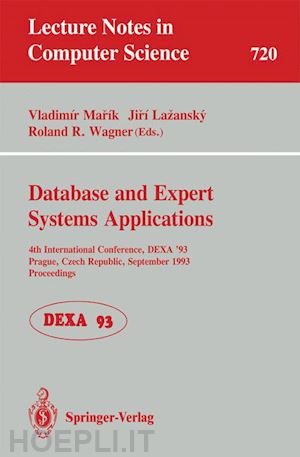
-
DISPONIBILITÀ IMMEDIATA
{{/disponibilitaBox}}
-
{{speseGratisLibroBox}}
{{/noEbook}}
{{^noEbook}}
-
Libro
-
-
SPEDIZIONE GRATUITA
- Genere: Libro
- Lingua: Inglese
- Editore: Springer Berlin Heidelberg
- Pubblicazione: 08/1993
- Edizione: 1993
Database and Expert Systems Applications
marik vladimir (curatore); lazansky jiri (curatore); wagner roland (curatore)
108,98 €
103,53 €
{{{disponibilita}}}
Disponibilità Normalmente disponibile in 15 giorni
TRAMA
This volume constitutes the proceedings of the 4th International Conference on Database and Expert Systems Applications (DEXA), held in Prague, Czech Republic, in September 1993. Traditionally the objective of the DEXA conferences is to serve as an international forum for the discussion and exchange of research results and practical experinece among theoreticians and professionals working in the field of database and artificial intelligence technologies. Despite the fact that in the conference title the applications aspect is mentioned explicitly, the theoretical and the practical points of view in the field are well-balanced in the program of DEXA'93. The growing importance of the conference series is outlined by the remarkably high number of 269 submissions and by the support given by renown organizations. DEXA'93 is held for the first time outside the former GDR in an East-European country, and is essentially contributing to the advancement of the East-West scientific cooperation in the field of database and AI systems. This proceedings contains the 78 contributed papers carefully selected by an international program committee with thesupport of a high number of subreferees. The volume is organized in sectionson data models, distributed databases, advanced database aspects, database optimization and performance evaluation, spatial and geographic databases, expert systems and knowledge engineering, legal systems, other database and artificial intelligence applications, software engineering, and hypertext/hypermedia and user interfaces.SOMMARIO
Information handling — A challenge for databases and expert systems.- Context versions in an object-oriented model.- Towards class-less object models for engineering design applications.- Semantic relativism in conceptual modeling.- Animation support for a conceptual modelling language.- A unifying model of data, metadata and context.- Information brokers: Sharing knowledge in a heterogeneous distributed system.- A customized multidatabase transaction management strategy.- Interoperability between a distributed system and a database system.- Reservation commitment and its use in multidatabase systems.- Predict query processing cost in a distributed database system.- CoBase: A cooperative query answering facility for database systems.- “Duplicate deletion in a ring connected, shared-nothing, parallel database system”.- On temporal-fuzziness in temporal Fuzzy databases.- Object-based schema integration for heterogeneous databases: A logical approach.- Heterogeneous multilevel transaction management with multiple subtransactions.- Inheritance conflicts in object-oriented systems.- Managing derived data in intelligent database systems: An implementation study.- An integrated calculation model for discovering functional relations from databases.- On the maintenance of implication integrity constraints.- REFLEX active database model: Application of petri-nets.- Road accident analysis using a functional database language.- Database performance evaluation a methodological approach.- Design and implementation of a DBMS performance assessment tool.- Modifying database queries and error constraints.- Performance evaluation system for object stores.- An optimization method of data communication and control for parallel execution of SQL queries.- Developing a database systemfor time-critical applications.- Object-oriented querying of existing relational databases.- A probabilistic spatial data model.- Query processing of geometric objects with free form boundaries in spatial databases.- Brain data base (BDB).- Integrating classes and relations to model and query geographical databases.- Towards cooperativeness in geographic databases.- GeO2: Object-oriented contribution for a geographical DBMS ?.- GemCode: An expert system generating mnemonic codes for data elements and data items.- ALEXSYS — A prototype knowledge based expert system for the quality assurance of high pressure die castings.- Viewpoints — Facilitating expert systems for multiple users.- Improving Shafer-Logan's algorithm for handling hierarchical evidence.- From low-level to high-level operations in expert systems.- Corpora as expert knowledge domains: The Oxford advanced learner's dictionary.- Maintenance of knowledge bases.- Using candidate space structure to propose the next measurement in model based diagnosis.- Decomposition of four component items.- Intelligent inference for debugging concurrent systems.- Sharing temporal knowledge by multiple agents.- Querying and exploring large knowledge bases.- Managing text objectively.- Legal expert system KONTERM — Automatic representation of document structure and contents.- Matrim, an expert system on marital law.- Contradiction and confirmation.- Meta-reasoning in law: a computational model.- The application of Kripke-type structures to regional development programs.- Data management tools for genomic applications: A progress report.- Resolution of constraint inconsistency with the aim to provide support in anaesthesia.- An object-oriented implementation for a semantic system (CANDID).- Distributed schema management ina cooperation network of autonomous agents.- A distributed AI system for job shop control.- Expert system for production planning of perishable goods.- An expert system as a manager in the application of production planning and control software in CIM environments.- Composition and dependency relationships in production information system design.- Vehicle Transactions.- An approach to image retrieval for image databases.- Facilitatory process for contrast detection.- Object-oriented database management systems for construction of CASE environments.- Summary data representations in application developments.- Reusable process chunks.- From analysis to design in a deductive and object-oriented environment.- A case study for an open CASE system: The TROLL light development environment.- Meta data model for database design.- Extending PCTE with object-oriented capabilities.- A new hypermedia data model.- Linearisation schemata for hypertext.- HyperPATH/O2: Integrating hypermedia systems with object-oriented database systems.- Integrating knowledge-based hypertext and database for task-oriented access to documents.- Reengineering of user interfaces for the migration of database applications.- User interface of knowledge based-DSS development environment, some further developments.- A highly-customisable schema meta-visualisation system for object-oriented (O-O) database schemas - overview.- Walkthrough using animation database system move.ALTRE INFORMAZIONI
- Condizione: Nuovo
- ISBN: 9783540572343
- Collana: Lecture Notes in Computer Science
- Dimensioni: 233 x 155 mm
- Formato: Brossura
- Illustration Notes: XVI, 776 p.
- Pagine Arabe: 776
- Pagine Romane: xvi
